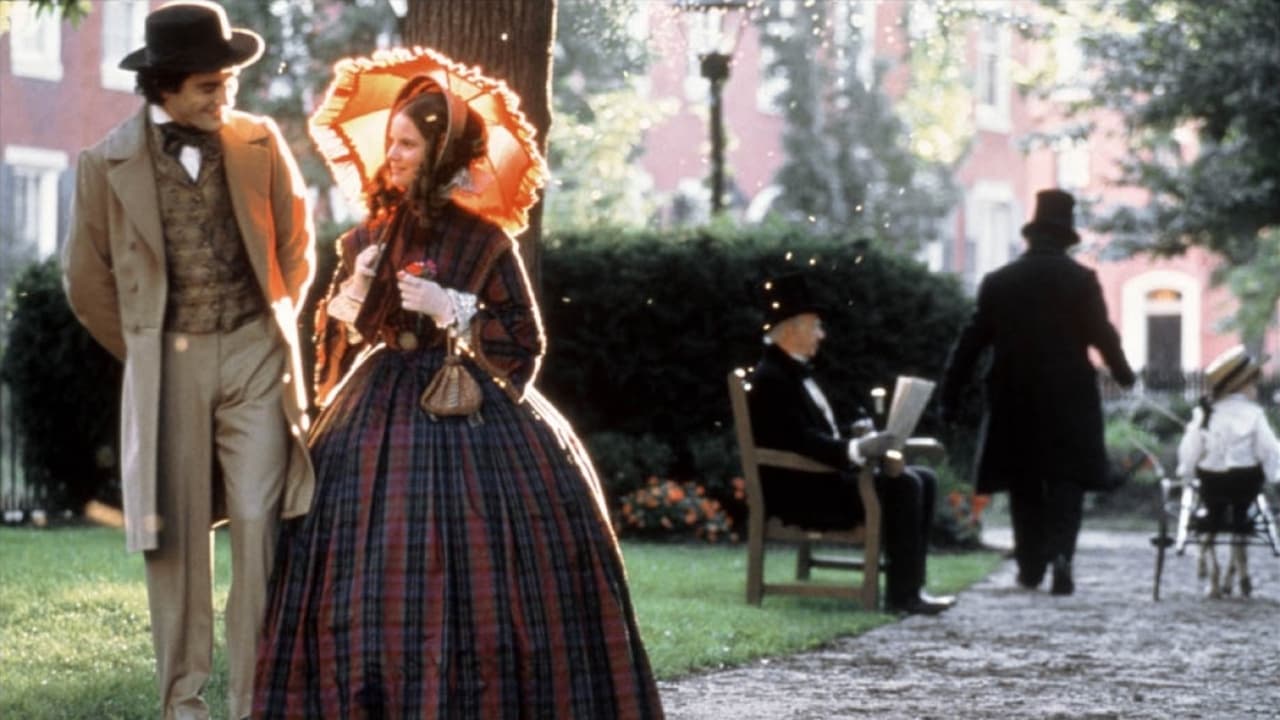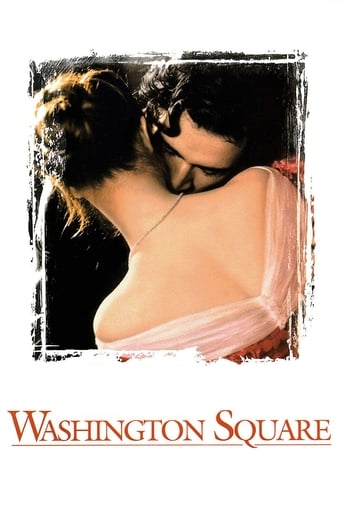

Catherine Sloper (Jennifer Jason Leigh) was a chubby, bumbling only child. Her mother died in childbirth. Her father Dr. Austin Sloper (Albert Finney) is dismissive of her. He raised her along with her Aunt Lavinia Penniman (Maggie Smith). At her cousin Marian Almond (Jennifer Garner)'s engagement party, the socially awkward Catherine is introduced to Morris Townsend (Ben Chaplin) who seems to be actually interested in her. Her father assumes that Morris is more interested in her inheritance.The younger Jennifer Jason Leigh always brought an innocence to her characters. She sidelines her usual sass in this one and she is definitely no prostitute here. I think her character needs a plainer looking girl but JJL is terrific nevertheless. The acting is first rate from Finney and Maggie Smith. It's a little slow at times but these are compelling performances.
... View MoreHenry James is one of our clearest writers of dense phrases. Reading him feels like swimming through interesting bodies tightly packed in pomegranate flavored honey, desiccated down to smudges on a page, then reconstituted by the eye through memories of that sweet fluid. Like that.It was he who refined the notion of internal, contradictory dialog and sometime untrusted narrative. He's important to what we have in film.I thought of him recently as I am in a patch of good movies. I saw a Louis Malle film last night and the style reminded me of James: economical ambiguity. Clean, but open. And the night before that I saw a film of a novel by George Eliot and I recalled what James said of Elliot that she had a horrible face, but he fell in love with her this from a man who never married and whose ability to love is questioned. Reminded me of Catherine from this story.So I sought this out and was surprised to find Jennifer Leigh. She's a sort of female Johnny Depp. Though she is accused of being overlarge in her characterizations, I find her engaging in pretty much every project. This business of exaggeration to be real is tricky business, and excess works in many cases. Visceral commitment trumps delicate reality, because reality IS commitment.Here's the problem: this is a complex book, a braid of four galaxies of urges collected in four beings and squared off against each other. The contrivance is only in the setup: the tragic wheels turn ultra-realistically.The film does not, cannot, reflect this with anywhere near the internal view of the novel. But I liked it. One cinematic trick that used is that nearly every scene has something in the background. It may be an obtrusive object, but is as likely to be a secondary character with some non-secondary trait. Or some activity you see in the back and can't ignore even though the continuity of the narrative is in the foreground.And that foreground is embodied in four quite talented actors, each with a fundamentally different acting style. These actors were selected because their styles contrast with that of the characters. Leigh for instance is one of the most visibly confident actors alive, while Finney who plays the overbearing father, has a style based on obvious fear of being.It isn't quite James. But it is superb, and in its way superior to any Mamet film. The woman making this is anything but clumsy. Ted's Evaluation -- 3 of 3: Worth watching.
... View MoreIt is unfair to compare the 1997 film "Washington Square" to the 1949 film "The Heiress." "Washington Square" is a faithful adaptation of Henry James' eponymous classic novel; "The Heiress" is based on the stage adaptation of the James novel by Augustus and Ruth Goetz.Hence, the two most dramatic scenes in "The Heiress" do not appear in "Washington Square" -- Morris Townsend's cruel jilting of Catherine right before their planned elopement, and Catherine's revenge in the final scene, where Morris is left pounding on the bolted door.There were many fine performances in "Washington Square," most notably Jennifer Jason Leigh. Her many expressions of hurt, pain, and anguish are heart-breaking to watch. Ben Chaplin's outstanding portrayal of "the fortune hunter" is surprisingly sympathetic. Maggie Smith's Aunt Lavinia is seen as meddling and trouble-making. The soundtrack is beautiful, and the set designs and costumes provide an accurate portrayal of 19th century New York.
... View MoreI rented WS in order to compare Jennifer Jason Leigh's performance in this with her performance in Kansas City. Both are period pieces, and in both i sensed her willingness to submerge a modern self into the demands of the historic period. This is frightening to behold--Albert Finney, her widowed father, is rock-hard, with glimpses of natural paternal sentiment that only make his determined hardness the more monstrous. So, his daughter Katherine is his victim--a victim of culture, a victim of circumstance--a victim of miscommunications, a victim of her lover, of her aunt? It's all a little hard to bear, except that, as the motif of endurance emerges, the formation of a protective shell over the passions of the young is, finally, a relief. I don't know if there is enough popcorn and chocolate/caramel/you-name-it to make sitting through this story actually enjoyable. Beautifully dressed and accompanied by exquisite score, it's a tragedy with a conclusion of unillumined defeat. Although Katherine, Leigh's role, keeps for herself, privately, the apparent pleasure of the memory of passion. Is this James's modern leaning? Anyway, I rated it high, because as a window into history it's at least fascinating.
... View More